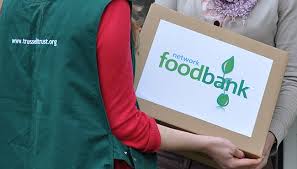
It's claimed fixing holes in social security help could reduce the need for food banks.
According to research carried out by four charities, gaps in the social safety net are a key reason why people are in need of food handouts.
Foodbank staff in Glenrothes say nearly 2, 000 people have come forward for help in recent months.
The findings of the jointly commissioned research published today by Oxfam, Child Poverty Action Group, Church of England and The Trussell Trust, also highlight some relatively simple fixes to the benefit system that could dramatically reduce the number of people who are left with little or no money to put food on the table.
The report, 'Emergency Use Only' interviewed 40 food bank users at seven Trussell Trust food banks, including six interviews in Scotland whose experiences help shed light on the factors that are driving food bank use in the UK. These interviews were backed up by additional data collected from 903 recipients at three Trussell Trust food banks and an analysis of the cases of 178 clients accessing an advice service at one food bank.
Key findings from the research showed:
· Food banks were predominantly a last-resort, short-term measure, prompted by an ‘acute income crisis', something which had happened to completely stop or dramatically reduce their income
· Income crisis could be caused by sudden loss of earnings, change in family circumstances or housing problems. However, for between half and two thirds of the users from whom additional data was collected, the immediate trigger for food bank use was linked to problems with benefits or missing tax credits
· Many food bank users were also not made aware of the various crisis payments available in different circumstances, and even fewer were receiving them
·19-28% of users for whom additional data was collected had recently had household benefits stopped or reduced because of a sanction and 28-34% were waiting for a benefit claim which had not been decided
· Many food bank users faced multiple challenges, including ill-health, relationship breakdown, mental health problems or substantial caring responsibilities. Many were unable to work or had recently lost their job. The frequency of bereavement among food bank users was also a striking feature of this research
Use of emergency food aid in the UK, particularly in the form of food banks, has dramatically increased over the last decade. Figures from The Trussell Trust show that throughout the UK, numbers receiving three days' food from their food banks rose from 128,697 in 2011-12 to 913,138 in 2013-14. In Scotland, there was an increase from 5726 to 71,428 in 2013-14.
Most food banks users interviewed spoke of how severe personal financial crises were often the last straw that had brought them there, only turning to food banks as a last resort when other coping strategies had failed. Deciding to accept help from a food bank was frequently described as 'embarrassing' and 'shameful' but users reported that they would have been completely bereft without it. Considerable personal strength and dignity was also shown by participants, with many displaying great resilience in spite of their circumstances.
The research showed that the very real challenges people face are too often being compounded, rather than assisted, by their experience of the social security system with half to two thirds of food bank users who took part in the report ending up there due, at least in part, to problems with the benefits system.
Rachael Orr, Head of Oxfam's UK Poverty Programme, said:
"Food banks are both a lifeline for people at a time of crisis and a symptom of fundamental failure in our society. This report gives a voice to food bank users in the UK and highlights relatively simple policy changes that could significantly reduce food bank use. MPs and their party leaders can’t solve individuals’ personal problems but they can and should act to provide an adequate safety net for those at a time of crisis."
While the research clearly shows that the recent increase in demand for food banks is largely a result of a lack of access to social security support, the charities say these findings also have implications for the Scottish Government and Scottish local authorities.
The research highlights the need to improve access to information and advice services, a call which is equally relevant in Scotland. Several of the families interviewed in Scotland highlighted how difficulty finding reliable and accessible advice locally had contributed to their financial crisis.
The experiences of those interviewed also suggested that more could be done locally to help prevent acute poverty and food bank use. Expensive public transport, a lack of support dealing with mental health problems and delays accessing the Scottish welfare fund were also highlighted were all cited as contributory factors to the families' financial difficulties.
John Dickie, Director of CPAG in Scotland, said,
"The research shows that while food bank use is clearly being pushed up by UK Government policy, there is a role for the Scottish Government and local authorities to play in maximising family incomes, minimising the cost of living and ensuring that local services meet the needs of families struggling to make ends meet."


 Man, 44, seriously injured in hospital after crash between Comrie and Rosyth
Man, 44, seriously injured in hospital after crash between Comrie and Rosyth
 John Swinney announces SNP leadership bid
John Swinney announces SNP leadership bid
 Closures on A92 from TONIGHT for roadworks
Closures on A92 from TONIGHT for roadworks
 13°C
13°C
 11°C
11°C
 17°C
17°C